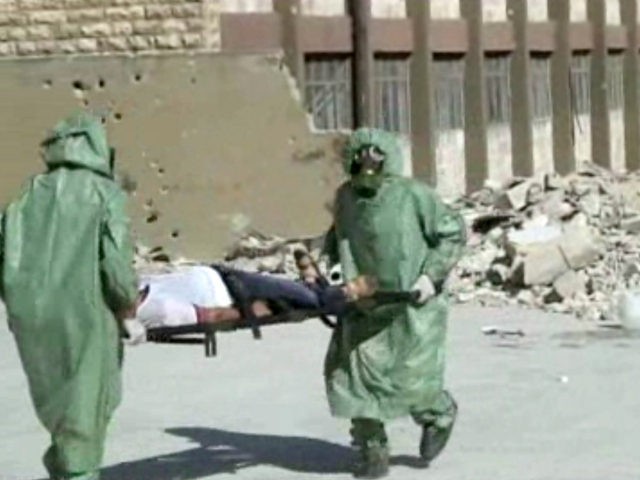An Iraqi scientist currently on death row for helping the Islamic State (ISIS/ISIL) develop chemical weapons confirmed that the jihadi group successfully made a new form of the lethal toxin sulfur mustard gas that killed and maimed thousands during World War I, the Washington Post (WaPo) reported this week, noting that the terrorist group likely hid some of those chemicals.
“It was important [for the Islamic State] to make something strong so that they could terrify,” Iraqi scientist Suleiman al Afari told the Post, referring to mustard gas. “It was more about creating horror, and affecting the psychology and the morale of troops fighting them. I don’t believe the quality of the weapons was ever at such a dangerous level.”
WaPo spoke to Afari in the semi-autonomous Kurdistan region in northern Iraq where authorities are holding him prisoner.
With the help of Afari and other scientists, chemists, and biologists – including at least one who worked for former Iraqi dictator Saddam Hussein’s weapons program – ISIS reportedly developed their own unique sulfur mustard gas.
WaPo explained:
The molecular makeup of the Islamic State’s mustard gas strongly suggested that the toxins were homemade. They were also crude, lacking key ingredients that would prevent the toxins from degrading quickly upon exposure to the environment.
At the Pentagon and at the White House, the discovery stoked fears that the terrorist group was beginning to manufacture primitive chemical weapons, and might soon acquire more-sophisticated ones.
Although an aggressive campaign launched by the U.S. and Iraq in 2016 decimated ISIS’s chemical weapons program, “the threat has not been entirely erased. Islamic State leaders moved equipment and perhaps chemicals from Iraq to Syria in 2016, Iraqi officials say, and some of it may have been buried or hidden,” the Post noted.
Citing Western officials and terrorism experts, the newspaper added, “The knowledge and skills acquired from Afari and other veterans of the program undoubtedly still exist, tucked away in computer files, flash drives and in the memories of the surviving participants who scattered as the group’s self-proclaimed caliphate collapsed.”
WaPo noted that the U.S. and Iraqi efforts in 2016 destroyed the quality of ISIS’s mustard gas, which remained poor and primitive after that.
Airstrikes ultimately prevented ISIS from developing more sophisticated weapons. Nevertheless, Arutz Sheva reported in December that ISIS is still threatening to carry out biological and radioactive attacks against the U.S.-led coalition fighting to demolish the remnants of the terrorist group in Iraq and Syria.
In July 2018, India also expressed concerns about reports that ISIS’s wing in South Asia had acquired chemical weapons and their delivery systems.
Australia’s Foreign Ministry, citing NATO, revealed in June 2015 that ISIS had gained access to radioactive material from hospital and research centers in the territory it had seized in Iraq and Syria, prompting fears that the group could develop a large “dirty” bomb.
The Ministry noted at the time that ISIS was recruiting “highly trained professionals” to develop chemical weapons.
In 2017, the Telegraph reported that U.S.-backed Iraqi forces found “radioactive materials” in the former ISIS base at the Mosul University.
Mosul University once served as the jihadist group’s headquarters, makeshift chemical weapons factory, training facility, and killing ground.
ISIS has expressed interest in building a weapon of mass destruction (WMD).
The Organization for the Prohibition of Chemical Weapons (OPCW), an international watchdog, and the U.S. military have confirmed that ISIS used sulfur-based chemical weapons against its enemies, including American troops.
Afari is one of the few known participants in ISIS’s chemical weapons program to be captured alive.
He reportedly recounted his recruitment and life under ISIS in Mosul, once considered the group’s largest stronghold in Iraq.
Referring to his “15-month stint supervising the manufacture of lethal toxins for the world’s deadliest terrorist group,” Afari told the Post, “Do I regret it? I don’t know if I’d use that word.”
“They had become the government and we now worked for them. We wanted to work so we could get paid,” he also said, adding, “They didn’t force anyone. I was afraid that I would lose my job. Government jobs are hard to get, and it was important to hang on to it.”

COMMENTS
Please let us know if you're having issues with commenting.